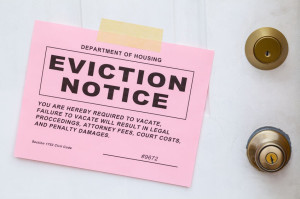 If you’re new to the eviction process, it can feel overwhelming. There are required steps involved and laws that need to be followed. The eviction process can also get costly. It’s certainly not something any landlord wants to have to deal with, but sometimes it’s necessary. In this blog, we’ll go over some details to help prepare you in case the worst should happen.
If you’re new to the eviction process, it can feel overwhelming. There are required steps involved and laws that need to be followed. The eviction process can also get costly. It’s certainly not something any landlord wants to have to deal with, but sometimes it’s necessary. In this blog, we’ll go over some details to help prepare you in case the worst should happen.
What Are Typical Causes for Evicting a Tenant?
The typical reasons that landlords start the eviction process are related to a tenant not paying rent, violating the lease, or damaging the property.
Keep in mind, it’s important to remember tenant rights. Landlords can’t evict them for discriminatory reasons. Landlords should also not file an eviction notice as a retaliation method, for example, if a tenant stops paying rent because the landlord doesn’t fulfill their end of the lease (providing livable accommodations) then the landlord may not win an eviction lawsuit (if it came to that). It’s important that a landlord uphold their end of the lease and hold onto documents that provide proof of this.
What’s the First Step?
Your first step will be to send out a notice. Different types of termination or eviction notices might be sent out; ones that involve a cause and ones that do not. Take note you can only send out a no-cause notice in certain states for those on month-to-month leases or less. With cause, notices can be written in a few different ways. If the tenant is overdue on rent, an eviction notice may give the tenant a specific number of days to make rent payments or leave. Another option is the quit notice, which is used if a tenant does something that goes against the lease. An example would be a tenant having pets when the lease prohibits this. The tenant is often given a date that this situation needs to be fixed by or the landlord will file for eviction. Another option that only works if the tenants are repeat violators is the unconditional quit notice. This is where the tenant is told they have to move out and aren’t given the option to fix the problem. Make sure to check your state laws about rules regarding evictions to make sure you’re following suit since these can vary from state to state.
What to Include In Your Eviction Notice?
You will need specific information in your notice. If there is a cause, you need to list the reason why you’re evicting the tenant. If a tenant is given the option to correct the problem, make sure you list the date this needs to be remedied. If they owe rent, ensure to include the exact figure of how much is owed.
How Should You Deliver an Eviction Notice?
Keep in mind that your state laws will probably have a requirement for how much time you need to give tenants. Make sure to look into this. When providing the eviction notice, it’s a good idea to not just place it on their door, but also to deliver it through certified mail. Make sure that you get a return receipt so that you have proof the tenant did receive it. Some states will have specific rules regarding how eviction notices should be delivered, so check this before moving forward.
What Options Do Tenants Have When They Receive an Eviction Notice?
When a tenant receives an eviction notice they have a few options to consider (depending on the type of notice given). The tenant may simply decide to move out or remedy the problem, making it easier for the landlord. However, there are other cases where a tenant may choose to do nothing, which means the landlord will need to proceed with an eviction lawsuit next.
What Do You Do If a Tenant Doesn’t Follow Through?
If the tenant does follow suit with the eviction notice, then it’s time to move toward an eviction lawsuit. Remember, no matter what the reason, it’s important to show up for the hearing. If a tenant is a no-show, it’s often ruled in the landlord’s favor. When prepping for your upcoming hearing, make sure that you keep a record of everything that could potentially be helpful in the case. It’s better to bring too many documents than not enough. The typical documents that you’ll want to include are the lease, payment records, bounced checks, a duplicate of the eviction notice, proof of delivery of the notice, and any records of communication between the tenant and you.
If you’re owed back rent, you may be able to file for a small claims case when you file for the eviction lawsuit or this may be handled during the eviction lawsuit. Make sure to talk to an attorney, your property manager, and check state laws for the best way to proceed with getting back rent.
What to Do If You Won an Eviction Hearing?
If you’ve won your eviction hearing, congratulations, you’re that much closer to getting your property back and being able to rent to new tenants. Make sure to follow any of the rules set out by the lawsuit. The tenant will be provided with a certain amount of time to gather their items and vacate the property. If the tenant doesn’t leave by the court-given date, then you will want to have a local law enforcement officer come to the property and accompany the tenant off the premises. If the tenant leaves anything behind, make sure to check state laws regarding what to do with this. You may be required to put it in storage for a said amount of time.
The eviction process can feel frustrating and overwhelming, but we’re here to help. When you choose to work with us at PMI, we’ll work hard to help avoid evictions by offering a thorough tenant screening process. And if the worst should happen, we will handle the eviction process for you. Check out our website today at: https://www.propertymanagementinc.com/.







